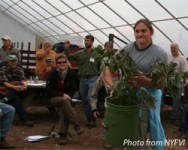Event Details
Date
March 23, 2017
Time
8:00 AM - 3:30 PM
Location
CCE Orleans County
12690 Rt 31
Albion, NY 14411
Cost
$75.00 workshop registration
(additional attendee $75.00 ea.)
$100.00 registration plus Weeds of the Northeast Handbook
(additional attendee $100.00 ea.)
includes lunch, refreshments, handouts, and other mtg costs
Host
Cornell Vegetable Program and Lake Ontario Fruit Team
Kim Hazel, Lake Ontario Fruit Team
585-798-4265
email Kim Hazel, Lake Ontario Fruit Team
Lake Ontario Fruit Team Event Reg.
EVENT HAS PASSED
In-depth Workshop on Management of Weeds in Fruit and Vegetables
March 23, 2017
Vegetable, tree fruit, and berry weed management strategies will be highlighted at this in-depth workshop. The day will begin with information on how to identify weeds and basic weed biology. Management strategies for different weed types (perennials, grasses, annuals) will be discussed as well as information about using herbicides safely and effectively for weed control. Sprayer technology options will be covered. There will be an open discussion at the end of the program for growers to ask questions.
8:00 - 8:15 AM -- Registration, DEC sign-up
Basic Weed Biology and Where Weeds Come From -- Darcy Telenko, CCE Cornell Vegetable Program
Tools and Resources to Identify Weeds -- Deborah Breth, CCE Lake Ontario Fruit Team
Management Strategies for Different Weed Types (perennials/grasses/annuals)
- Perennial broadleaves -- Deborah Breth will describe characteristics and highlight management strategies for each: Bindweed, Canada thistle, sowthistles, Japanese knotweed, horsenettle, toadflax, goldenrod/fleabane dock - curly and broadleaf, dandelion, clover
- Grasses/sedge -- Christy Hoepting will describe characteristics and highlight management strategies for grasses and sedges: Yellow nutsedge, quackgrass, foxtails, tall fescue, barnyard grass, crabgrass
- Annual broadleaves -- Darcy Telenko will describe specific annual weeds that are problems and highlight management strategies: Prostrate knotweed, ragweed, galinsoga, common groundsel, wild buckwheat, horseweed/marestail, deadnettle, bittercress, jimsonweed, nightshades, burcucumber, mugwort, velvetleaf, purslane, mustards
Hoepting will review various herbicide labels printing out specific areas that are important to review before using herbicides including water conditioners, effect of soil type on rates, spray volumes required, crop rotation restrictions, herbicide coverage requirements (weed residue management), etc. Examples of herbicide types reviewed include foliar systemic, foliar contact, selective herbicide for grasses vs. broadleaves, and soil applied residual herbicides.
Catered lunch and updates from industry sponsors
Effective Use of Herbicides -- Darcy Telenko
Telenko will describe concepts of weed thresholds for specific crops relative to crop stage of growth, the stage of growth of the weed to target with control strategy, mechanism of action of herbicides, herbicide resistance management.
Sprayer Technology: Many Ways to Hit the Target -- Andrew Landers, NYS Agricultural Experiment Station
Safety Requirements for Application of Herbicides -- Deborah Breth
Open Discussion: Can we solve your weed problem?
- Breth will respond to Tree Fruit and Berry Weed Management questions and review the herbicide by weed cross references for fruit crops
- Telenko and Hoepting will respond to Vegetable Weed Management questions will review the herbicide cross reference for vegetable crops
3:30 PM Adjourn
COST: $75 per person. You may purchase a copy of the Weeds of the Northeast Handbook for $25.
REGISTER: Please pre-register by March 21. Registration for this event is being taken by the CCE Lake Ontario Fruit Team. Pay online or use the form provided below to mail in your registration fee.
Agenda and Mail-in Registration Form (PDF; 262KB)



































